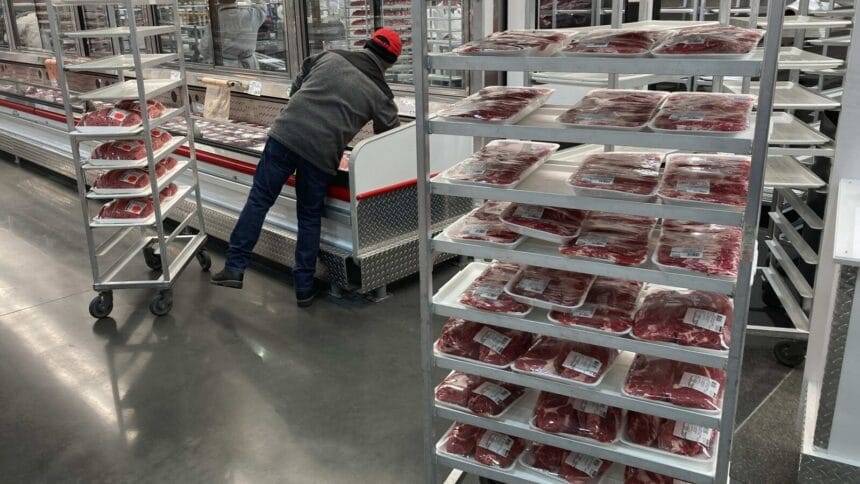Main Points In Hindi (मुख्य बातें – हिंदी में)
-
नियामक समर्थन की आवश्यकता: भारत में प्रयोगशाला में उगाए गए मांस, डेयरी, और अंडा उत्पादों के लिए एक नियामक ढांचे की आवश्यकता है। भारतीय खाद्य सुरक्षा और मानक प्राधिकरण (एफएसएसएआई) को इन उत्पादों के मानकों को स्थापित करने के लिए प्रतिनिधित्व किया गया है।
-
सार्वजनिक स्वास्थ्य और पारिस्थितिकी पर प्रभाव: प्रयोगशाला में विकसित मांस उत्पादों के संबंध में चिंताएँ सार्वजनिक स्वास्थ्य, खाद्य सुरक्षा और पारिस्थितिक स्थिरता के मुद्दों को लेकर बढ़ रही हैं। ये उत्पाद कम संसाधनों का उपयोग करते हैं और पशु क्रूरता को खत्म करने का प्रयास करते हैं।
-
उद्योग में विकास की संभावनाएँ: भारत में कई स्टार्ट-अप और कंपनियाँ प्रयोगशाला में उगाए गए मांस और किण्वन-व्युत्पन्न प्रोटीन उत्पादों पर ध्यान केंद्रित कर रही हैं, और यह क्षेत्र वैश्विक मानकों के अनुरूप विकसित हो सकता है।
-
विश्लेषकों की मिश्रित राय: विशेषज्ञों ने प्रयोगशाला में विकसित मांस के भविष्य को लेकर मिश्रित राय व्यक्त की है। कुछ इसे संभावित अवसर मानते हैं, जबकि अन्य इसकी व्यावसायिक सफलता पर संदेह जताते हैं।
- भारत की पशुधन बाजार में स्थिति: भारत में दुनिया की सबसे बड़ी पशुधन आबादी है, और देश मांस उत्पादन में महत्वपूर्ण भूमिका निभाता है। यह मांस बाजार में अंतर्राष्ट्रीय प्रतिस्पर्धा और स्थायी प्रोटीन समाधानों के लिए एक महत्वपूर्ण अवसर प्रस्तुत करता है।
Main Points In English(मुख्य बातें – अंग्रेज़ी में)
Here are the main points from the provided text:
-
Regulatory Developments: The Indian food regulator, FSSAI, is addressing the regulatory framework for lab-grown meat, dairy, and egg products amid public health, food security, and environmental sustainability concerns.
-
Industry Representation: The People for Animals-Public Policy Foundation has submitted a request to FSSAI for establishing standards for cellular meat, indicating a push for regulation in this emerging sector.
-
Market Potential in India: With over 15 companies focusing on lab-grown and fermentation-derived protein products in India and increased interest from global firms, there is significant growth potential for this industry despite existing challenges.
-
Mixed Reactions from Experts: While some experts see promising opportunities for lab-grown meat in India, others express skepticism regarding its scalability and environmental claims, highlighting cultural attitudes toward meat consumption.
- Public Health Concerns: Advocates argue that lab-grown meat can reduce the public health risks associated with traditional meat production, which is linked to zoonotic diseases and unsanitary conditions of animal farming.


Complete News In Hindi(पूरी खबर – हिंदी में)
नई दिल्ली: प्रयोगशाला में उगाए गए मांस, डेयरी और अंडा उत्पादों पर बहस जल्द ही सुलझ सकती है, यह मुद्दा भारत के शीर्ष खाद्य नियामक तक पहुंच जाएगा, विकास से अवगत तीन लोगों ने कहा। यह विकास सार्वजनिक स्वास्थ्य, खाद्य सुरक्षा और पारिस्थितिक स्थिरता के बारे में चिंताओं की पृष्ठभूमि में आता है।
जबकि भारतीय खाद्य सुरक्षा और मानक प्राधिकरण (एफएसएसएआई) ने पौधे-आधारित प्रोटीन उत्पादों के लिए एक नियामक ढांचा तैयार किया है, किण्वन-व्युत्पन्न और संवर्धित प्रोटीन उत्पादों के निर्माता और विक्रेता एक नियामक शून्य में काम कर रहे हैं।
पूर्व केंद्रीय मंत्री मेनका गांधी की पीपुल्स फॉर एनिमल्स-पब्लिक पॉलिसी फाउंडेशन (पीएपीपीएफ) द्वारा एफएसएसएआई को नियम बनाने के लिए एक प्रतिनिधित्व दिया गया है, जैसा कि एफएसएसएआई द्वारा समीक्षा किए गए 13 नवंबर के संचार के अनुसार है। पुदीना.
गांधी ने ईमेल के जवाब में कहा, ”हमने एफएसएसएआई से मानक बनाने को कहा है।” टकसाल का प्रश्न.
एफएसएसएआई के एक अधिकारी ने नाम न छापने का अनुरोध करते हुए पुष्टि की, “हमें उनसे सेलुलर मांस पर प्रस्तुतिकरण प्राप्त हुआ है।” खाद्य नियामक का कोई भी निर्णय देश में किण्वन-व्युत्पन्न और खेती किए गए मांस, डेयरी और अंडा उत्पादों के प्रक्षेप पथ को तय करने में मदद करेगा।
यह विकास इस बात को देखते हुए महत्व रखता है कि भारत 15 से अधिक कंपनियों का घर है जो कि खेती किए गए मांस और किण्वन-व्युत्पन्न स्मार्ट प्रोटीन उत्पादों पर केंद्रित हैं, कई भारतीय स्टार्ट-अप इन उत्पादों को बाजार में ले जाने की योजना बना रहे हैं और नियामक अनुमोदन के लिए आवेदन करने की योजना बना रहे हैं।
यह ऐसे समय में आया है जब वैश्विक फर्मों की भारत में इस क्षेत्र में रुचि बढ़ रही है, जबकि अमेरिका, यूरोपीय संघ, सिंगापुर और इज़राइल संवर्धित और किण्वन-व्युत्पन्न प्रोटीन के लिए नियम जारी कर रहे हैं।
गांधी ने अपने ईमेल के जवाब में कहा, “लगभग 8 साल पहले, केंद्रीय स्वास्थ्य और परिवार कल्याण मंत्रालय ने सेलुलर मांस बनाने के लिए एक परियोजना शुरू की थी।” यह परियोजना हैदराबाद में सेंटर फॉर सेल्युलर एंड मॉलिक्यूलर बायोलॉजी (सीसीएमबी) को दी गई थी। दुनिया भर में, दर्जनों कंपनियों ने सेलुलर मांस और दूध बनाना शुरू कर दिया है, और यह सिंगापुर और कई अन्य स्थानों पर बिक्री पर है, इस मांस का लाभ यह है कि मांस खाने वाले पशु क्रूरता से मुक्त और रोग मुक्त असली मांस खा सकते हैं। “
एफएसएसएआई को ईमेल किए गए प्रश्न प्रेस समय तक अनुत्तरित रहे।
विश्व स्तर पर, ये उत्पाद ‘वैकल्पिक प्रोटीन’ की श्रेणी में आते हैं। भारत में, उन्हें ‘स्मार्ट प्रोटीन’ कहा जाता है, और इन्हें कम भूमि, पानी और ऊर्जा के साथ उत्पादित किया जा सकता है, और पशु-आधारित उत्पादों की तुलना में कम उत्सर्जन उत्सर्जित करते हैं। स्मार्ट प्रोटीन एंटीबायोटिक्स से भी मुक्त होते हैं, जिससे ज़ूनोटिक रोग का खतरा कम हो जाता है।
मिश्रित प्रतिक्रिया
विशेषज्ञों ने कहा कि प्रयोगशाला में विकसित मांस पारंपरिक पशु मांस उद्योग के बाजार हिस्सेदारी का 10-15% हिस्सा हासिल कर सकता है। हालाँकि, यह लंबे समय तक कायम नहीं रह सकता है।
वरिष्ठ पोल्ट्री और कृषि विश्लेषक दीपक चव्हाण ने कहा, “भारत में प्रयोगशाला में विकसित मांस के लिए गुंजाइश है, क्योंकि नई पीढ़ी में इसके बारे में जागरूकता की भावना है।” उन्होंने कहा कि चीन और अमेरिका ने प्रयोगशाला में अग्रणी भूमिका निभाई है। -मांस उगाया जाता है, जबकि भारत पीछे है।
चव्हाण ने कहा, “भारतीयों में प्रोटीन कुपोषण की व्यापकता और पौधे-आधारित और पशु-आधारित प्रोटीन उद्योगों के विकास में चुनौतियों को ध्यान में रखते हुए, प्रयोगशाला में विकसित मांस उद्योग भविष्य में विकास की महत्वपूर्ण संभावनाएं दिखाता है।”
दूसरी ओर, श्रीनिवास फार्म्स के प्रबंध निदेशक सुरेश चित्तूरी ने कहा कि सेल्यूलर मीट भारत में सफल नहीं हो सकता है।
चित्तूरी ने कहा, “मुद्दा यह है कि ये लोग लैब-विकसित मांस के बारे में जो दावे कर रहे हैं उनमें से कई दावे पूरे नहीं हुए हैं, खासकर पर्यावरणीय प्रभाव के बारे में।” उन्होंने कहा कि कोई भी देश बड़े पैमाने पर उत्पादन बढ़ाने में सक्षम नहीं है।
चित्तूरी ने कहा, “जो लोग मांस नहीं खाना चाहते, वे मांस जैसे उत्पाद खाने के बारे में भी नहीं सोचेंगे।” कोशिश करें लेकिन इसे लंबे समय तक जारी न रखें।”
पशु अधिकार संगठन पेटा इंडिया में शाकाहारी परियोजनाओं के प्रबंधक किरण आहूजा ने कहा कि प्रयोगशाला में विकसित मांस एक आशाजनक भविष्यवादी विचार है जो मारे गए जानवरों के बजाय प्रयोगशाला में कोशिकाओं से बनाए गए मांस से अरबों जानवरों के जीवन को बचा सकता है।
आहूजा ने कहा, “प्रयोगशाला में तैयार किया गया मांस सुरक्षित है क्योंकि इसकी खेती बाँझ और नियंत्रित वातावरण में की जाती है, डरे हुए, मारे गए जानवरों के मांस के विपरीत।” यह उल्लेख करते हुए कि सुसंस्कृत मांस महामारी को समाप्त करने में मदद कर सकता है, उन्होंने कहा कि पारंपरिक मांस उत्पादन मनुष्यों को अस्वच्छ परिस्थितियों में उजागर करता है और बैक्टीरिया और जूनोटिक रोगों के पनपने के लिए अनुकूल वातावरण तैयार करता है।
उन्होंने कहा, “सार्स, बर्ड फ्लू, स्वाइन फ्लू और, संभवतः, कोविड-19 का भोजन के लिए इस्तेमाल किए जाने वाले जानवरों के इलाज से संबंध है, जो इन प्रथाओं से उत्पन्न गंभीर सार्वजनिक स्वास्थ्य जोखिमों को दर्शाता है।”
PAPPF ने क्या कहा?
FSSAI को भेजे गए पत्र में, PAPPF ट्रस्टी और सदस्य सचिव गौरी मौलेखी ने कहा, “भारत में, जहां शहरीकरण, बढ़ती भोजन और प्रोटीन की मांग, सार्वजनिक स्वास्थ्य संबंधी चिंताएं और पारिस्थितिक स्थिरता के बीच संतुलन नाजुक है, किण्वन-व्युत्पन्न और खेती किए गए उत्पाद समय पर उपलब्ध होते हैं। और आशाजनक समाधान।”
मौलेखी ने संचार में कहा कि उनकी बढ़ती प्रासंगिकता के बावजूद, किण्वन-व्युत्पन्न और खेती किए गए उत्पादों को कई नियामक चुनौतियों का सामना करना पड़ता है जो भारत में उनकी क्षमता को सीमित करते हैं। संचार में कहा गया है, “भारतीय कंपनियों को विशेष रूप से खेती किए गए मांस के लिए नियामक आवश्यकताओं पर दिशानिर्देशों की आवश्यकता है।”
पिछले महीने, पीएपीपीएफ ने एफएसएसएआई के सीईओ और उद्योग हितधारकों को ऐसे उत्पादों का प्रदर्शन करने के लिए नई दिल्ली में एक कार्यक्रम की मेजबानी की थी। “प्रयोगशाला में विकसित मांस को पशुओं के वध के बिना प्रयोगशाला में जानवरों के ऊतकों से तैयार किया जाता है। भारत के पास संवर्धित मांस में अग्रणी बनने का अवसर है। यह टिकाऊ है और स्मार्ट प्रोटीन लक्ष्यों को पूरा करेगा,” मौलेखी ने बताया पुदीना.
भारतीय मांस बाज़ार
यह मुद्दा इसलिए महत्वपूर्ण है क्योंकि भारत में दुनिया की सबसे बड़ी पशुधन आबादी है। पशुपालन और डेयरी मंत्रालय के अनुसार, देश भैंस के मांस का सबसे बड़ा उत्पादक, बकरी के मांस का दूसरा सबसे बड़ा उत्पादक और पोल्ट्री मांस उत्पादन में पांचवें स्थान पर है।
मंत्रालय के आंकड़ों से पता चला है कि 2022-23 में, भारत ने लगभग 2.1 मिलियन टन मवेशी, 13.6 मिलियन टन भैंस, 73.7 मिलियन टन भेड़, 9.3 मिलियन टन सूअर और 331.5 मिलियन पोल्ट्री मांस का उत्पादन किया।
वाणिज्यिक खुफिया और सांख्यिकी महानिदेशालय के अनुसार, 2023-24 में भारत के पशु उत्पादों का निर्यात 4.5 बिलियन डॉलर का था, जिसमें 3.7 बिलियन डॉलर का भैंस का मांस, 184.58 मिलियन डॉलर का पोल्ट्री मांस और 77.68 मिलियन डॉलर का भेड़ या बकरी का मांस शामिल था।
पूजा दास ने इस कहानी में योगदान दिया
Complete News In English(पूरी खबर – अंग्रेज़ी में)
New Delhi: The debate surrounding lab-grown meat, dairy, and egg products may soon reach India’s top food regulatory authority, as noted by three sources familiar with the developments. This comes amidst concerns about public health, food safety, and ecological sustainability.
While the Food Safety and Standards Authority of India (FSSAI) has established a regulatory framework for plant-based protein products, manufacturers and sellers of fermentation-derived and cultivated protein products are currently operating in a regulatory void.
The People’s for Animals-Public Policy Foundation (PAPPF), headed by former Union Minister Maneka Gandhi, has submitted a representation to FSSAI to formulate regulations, as per a communication reviewed by FSSAI on November 13th, according to Pudina.
Gandhi stated in an email response, “We have requested FSSAI to establish standards.” Pudina reported.
An FSSAI official, speaking on condition of anonymity, confirmed, “We have received a presentation from them regarding cellular meat.” Any decision made by the food regulator will help shape the future of fermentation-derived and cultivated meat, dairy, and egg products in the country.
This development is significant as India hosts more than 15 companies focused on cultivated meat and fermentation-derived smart protein products, with many Indian startups planning to introduce these products to the market and seek regulatory approval.
The timing is also noteworthy as global firms are showing increasing interest in this sector in India, while countries like the USA, EU, Singapore, and Israel are implementing regulations for enhanced and fermentation-derived protein.
Gandhi added in her email response, “About eight years ago, the Ministry of Health and Family Welfare initiated a project to develop cellular meat. This project was assigned to the Center for Cellular and Molecular Biology (CCMB) in Hyderabad. Worldwide, dozens of companies have started producing cellular meat and milk, which are already being sold in Singapore and elsewhere; the advantage of this meat is that it allows meat-eating animals to consume cruelty-free and disease-free real meat.”
FSSAI has not yet responded to the email inquiries as of press time.
Globally, these products fall under the category of ‘alternative proteins.’ In India, they are referred to as ‘smart proteins’ and can be produced with less land, water, and energy, resulting in lower emissions compared to animal-based products. Smart proteins are also free from antibiotics, reducing the risk of zoonotic diseases.
Mixed Reactions
Experts suggest that lab-grown meat could capture 10-15% of the market share of the traditional meat industry. However, they caution that this may not be sustainable in the long run.
Senior poultry and agriculture analyst Deepak Chavan noted, “There is potential for lab-grown meat in India, especially since the new generation is becoming aware of it.” He mentioned that countries like China and the USA are leading in lab-grown meat production, while India is still catching up.
Chavan added, “Considering the widespread protein malnutrition in Indians and the challenges faced by both plant-based and animal-based protein industries, the lab-grown meat sector shows significant growth prospects for the future.”
On the other hand, Suresh Chitturi, Managing Director of Srinivasa Farms, expressed skepticism about the success of cellular meat in India.
Chitturi said, “The issue is that many claims made about lab-grown meat are unproven, particularly regarding environmental impacts.” He asserted that no country has yet managed to scale up production significantly.
He added, “Those who don’t want to consume meat are unlikely to consider meat-like products, even if they are available.”
Kiren Ahuja, the vegetarian projects manager at animal rights organization PETA India, argued that lab-grown meat is a promising futuristic concept that could save billions of animals’ lives by using cells cultivated in labs instead of slaughtered animals.
Ahuja stated, “Lab-grown meat is safe as it is produced in sterile and controlled environments, unlike meat from terrified, slaughtered animals.” She noted that cultured meat could help eliminate pandemics, as traditional meat production exposes humans to unsanitary conditions that create a favorable environment for bacteria and zoonotic diseases to flourish.
She highlighted, “SARS, bird flu, swine flu, and possibly COVID-19 are linked to the treatment of animals used for food, which reflects serious public health risks associated with these practices.”
What did PAPPF say?
In a letter to FSSAI, Gauri Maulekhi, trustee and member secretary of PAPPF, remarked, “In India, where urbanization, rising food and protein demands, public health concerns, and ecological sustainability are delicately balanced, fermentation-derived and cultivated products are timely and promising solutions.”
Maulekhi stated in the communication that despite their increasing relevance, fermentation-derived and cultivated products face several regulatory challenges that limit their potential in India. The communication indicated, “Indian companies specifically require guidance on regulatory requirements for cultivated meat.”
Last month, PAPPF hosted an event in New Delhi for FSSAI CEO and industry stakeholders to showcase such products. “Lab-grown meat is prepared from animal tissues in labs without slaughtering animals. India has the opportunity to become a leader in enhanced meat. It’s sustainable and will meet smart protein goals,” Maulekhi revealed to Pudina.
Indian Meat Market
This issue is crucial because India has the largest livestock population in the world. According to the Ministry of Animal Husbandry and Dairying, the country is the largest producer of buffalo meat, the second-largest producer of goat meat, and ranks fifth in poultry meat production.
Ministry data shows that in 2022-23, India produced approximately 2.1 million tons of cattle, 13.6 million tons of buffalo, 73.7 million tons of sheep, 9.3 million tons of pork, and 331.5 million tons of poultry meat.
According to the Directorate General of Commercial Intelligence and Statistics, India’s exports of animal products were valued at $4.5 billion in 2023-24, including $3.7 billion in buffalo meat, $184.58 million in poultry meat, and $77.68 million in sheep or goat meat.
Pooja Das contributed to this story.








